2022年牛津译林版中考英语语法系列课件(8)—一般将来时(23张ppt)
文档属性
| 名称 | 2022年牛津译林版中考英语语法系列课件(8)—一般将来时(23张ppt) |  | |
| 格式 | ppt | ||
| 文件大小 | 489.0KB | ||
| 资源类型 | 教案 | ||
| 版本资源 | 通用版 | ||
| 科目 | 英语 | ||
| 更新时间 | 2021-12-30 14:56:38 | ||
图片预览


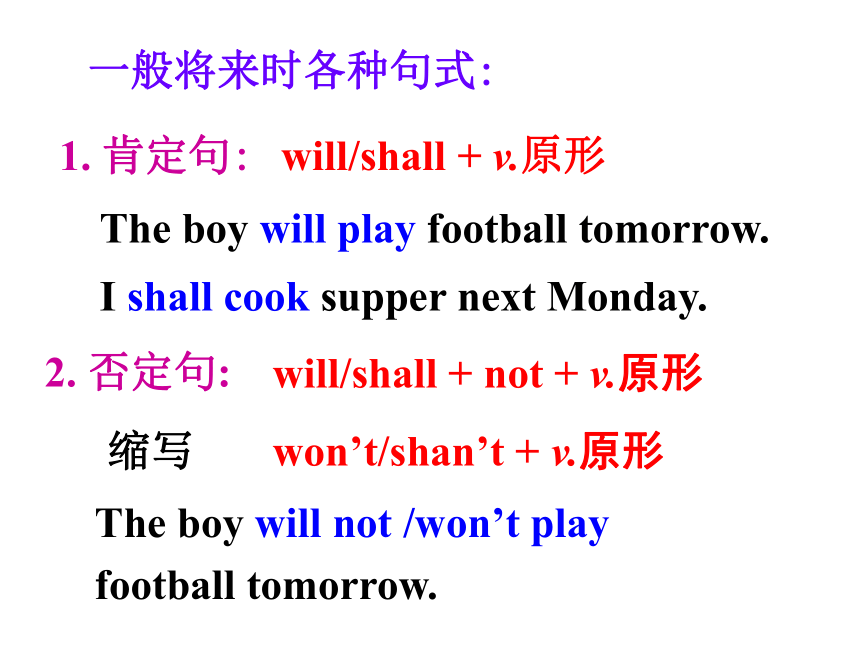
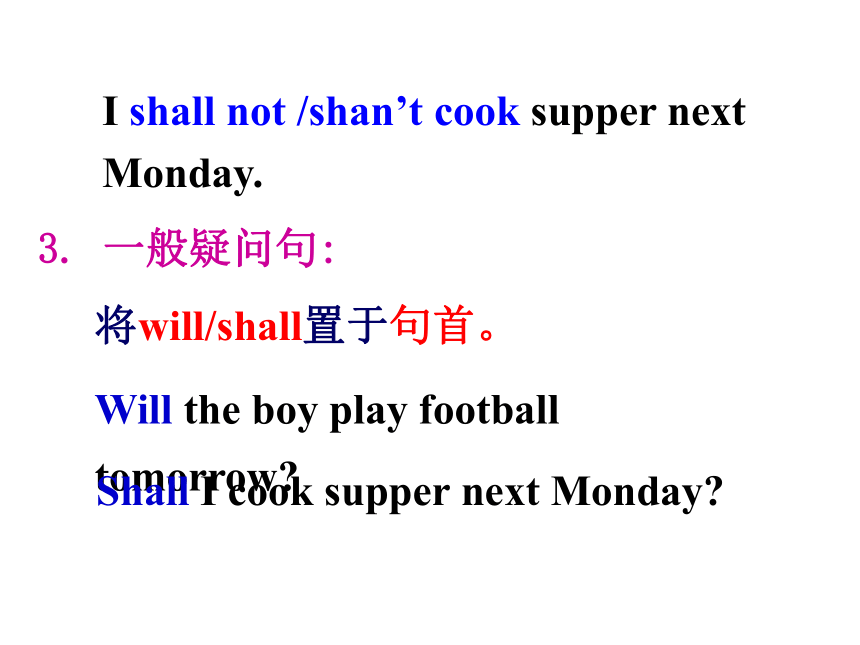
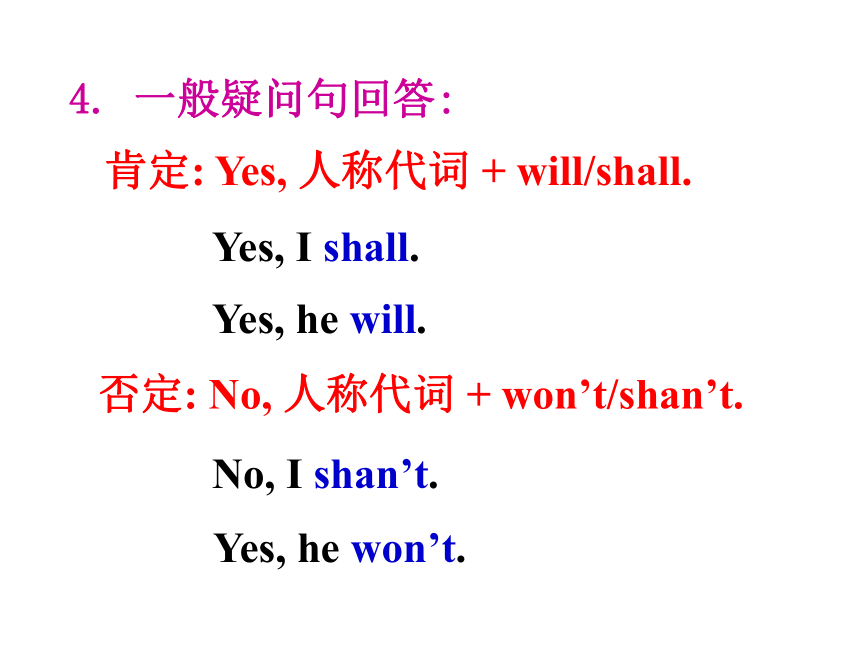
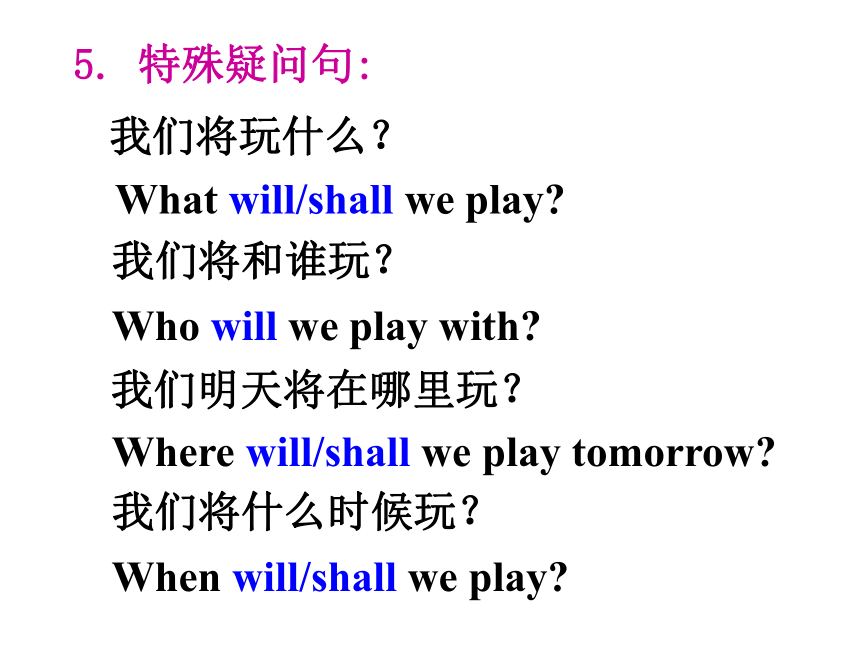
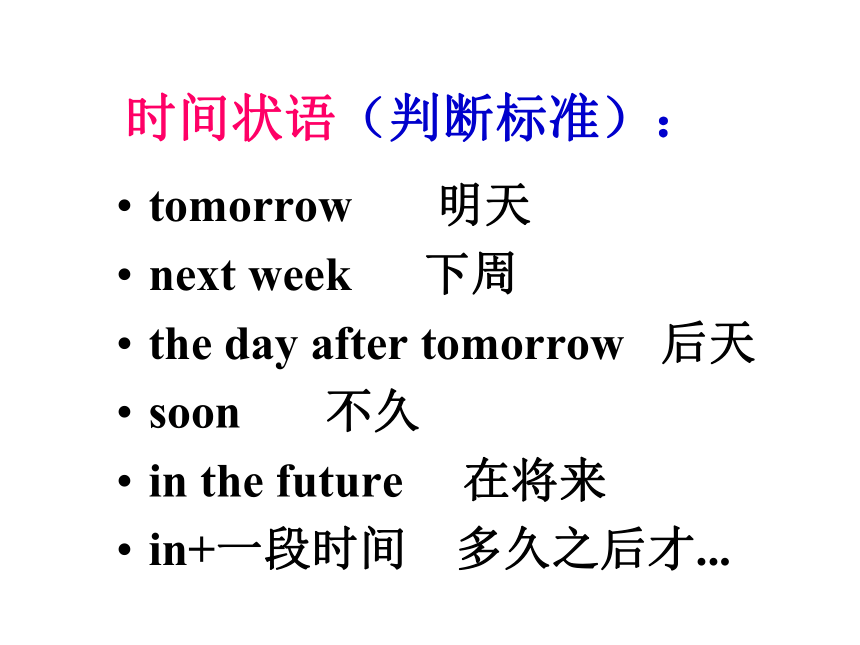
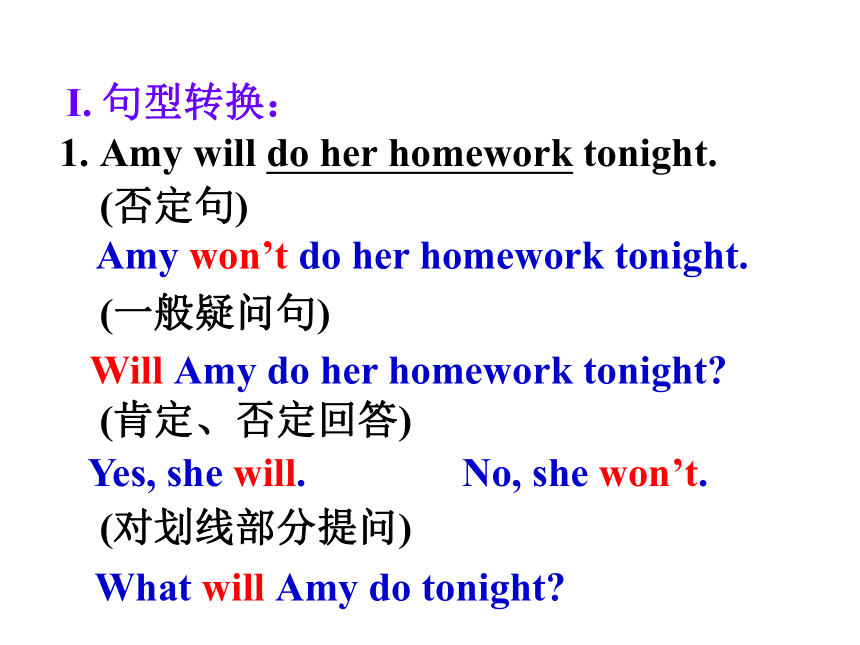
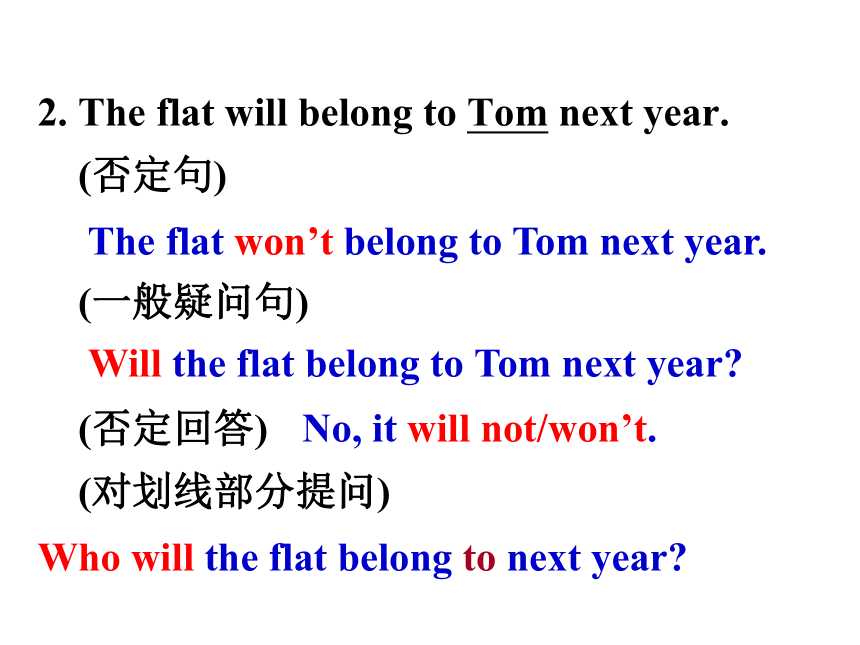
文档简介
(共23张PPT)
一般将来时
will + do 表示将来某时要发生的动作或存在的状态,也表示将来经常或反复发生的动作。
I will go to see my uncle this afternoon.
We will visit the Great Wall next week.
She will watch TV play at home tonight.
My mom will get me an MP3 tomorrow.
People will have robots in the future.
一般将来时各种句式:
1. 肯定句:
will/shall + v.原形
The boy will play football tomorrow.
I shall cook supper next Monday.
2. 否定句:
will/shall + not + v.原形
won’t/shan’t + v.原形
The boy will not /won’t play football tomorrow.
缩写
I shall not /shan’t cook supper next Monday.
3. 一般疑问句:
将will/shall置于句首。
Will the boy play football tomorrow
Shall I cook supper next Monday
4. 一般疑问句回答:
肯定: Yes, 人称代词 + will/shall.
否定: No, 人称代词 + won’t/shan’t.
Yes, I shall.
Yes, he will.
No, I shan’t.
Yes, he won’t.
5. 特殊疑问句:
What will/shall we play
Who will we play with
我们将玩什么?
我们将和谁玩?
我们明天将在哪里玩?
Where will/shall we play tomorrow
我们将什么时候玩?
When will/shall we play
时间状语(判断标准):
tomorrow 明天
next week 下周
the day after tomorrow 后天
soon 不久
in the future 在将来
in+一段时间 多久之后才...
1. Amy will do her homework tonight.
(否定句)
(一般疑问句)
(肯定、否定回答)
(对划线部分提问)
Amy won’t do her homework tonight.
Will Amy do her homework tonight
Yes, she will.
No, she won’t.
What will Amy do tonight
I. 句型转换:
2. The flat will belong to Tom next year.
(否定句)
(一般疑问句)
(否定回答)
(对划线部分提问)
The flat won’t belong to Tom next year.
Will the flat belong to Tom next year
No, it will not/won’t.
Who will the flat belong to next year
3. I shall eat noodles this evening.
(1)
(2)
4. My mother will carry all the food.
(1)
(2)
What shall I eat this evening
When shall I eat noodles
What will my mother carry
Who will carry all the food
II. 用正确的时态填空。
1. The twin brothers _______ (go) fishing next Tuesday.
2. We _____________ (meet) outside the school gate tomorrow.
3. — How ____ they ____ (visit) the History Museum next week
— By bus.
will go
will/shall meet
will visit
4. He tried three times, he _________ (finish) this hard work in the end.
5. Look! The sun _________ (shine) in through the window.
6. _____ we ____ (take) different routes
7. Madee _____ (live) in a small town in Thailand. It __ (be) beautiful and quiet there, but it _____ (rain) a lot.
will finish
is shining
Shall take
lives
is
rains
8. He ________ (sit) on the balcony and _______ (look) out at the park at present.
9. — When ____ you ______ (arrive) in Beijing
— Two hours later.
10. — How long _____ it ____ (take) you to get there by the train
— Two hours and a half.
is sitting
looking
will arrive
does take
“be going to + do”结构 表示将要发生的事或打算、计划、决定要做的事情。例如:
I am going to go shopping with mom this afternoon.
We are going to visit Tibet for a week.
They are going to have a party for Mary’s birthday this evening.
She is going to work in Japan next week.
He is going to ride his bike to the Great Wall this Saturday.
be going to各种句式:
1. 肯定句:
be going to + v.原形
2. 否定句:
be + not + going to + v.原形
The boy is going to play football tomorrow.
The boy is not /isn’t going to play football tomorrow.
3. 一般疑问句:
将be置于句首。
Is the boy going to play football tomorrow
4. 一般疑问句回答:
肯定: Yes, 人称代词 + be.
Yes, he is.
否定: No, 人称代词 + be + not.
No, he isn’t.
5. 特殊疑问句:
(1) 疑问词 + be + 主语 + going to + v.原形
Where is he going
他打算去哪里?
Who is going to play football
你打算去哪里踢足球?
(2) 疑问词 + is + going to + v.原形 + 其他
你打算什么时候去踢足球?
谁打算去踢足球?
When are you going to play football
Where are you going to play football
将来时的典型标志:
next Tuesday / week / month …
Tomorrow (morning/afternoon …)
this afternoon … /Sunday …
tonight
the coming Sunday …
the day after tomorrow
soon
in the future
今夜
不久
(在)将来
后天
in + 一段时间
……后
即将到来的星期天…
We _______________ (meet) outside the school gate tomorrow.
2. How ____ they ___________ (visit) the History Museum next week
3. Look! The sun _________ (shine) in through the window.
4. He _________ (sit) on the balcony and _______ (look) out at the park at present.
Exercises
shall/will meet
are going to meet
will
visit
are
going to visit
is shining
is sitting
looking
5. We are going to have an exam next week.(改为否定句并提问)
6. Tom will see a film this evening.
(提问)
We aren’t going to have an exam next week.
What are we going to have next week
What will Tom see this evening
7. Madee is studying Chinese now.
(用 next year 改写)
8. 两天后学校里将有一场排球比赛。
Madee will/is going to study Chinese next year.
There will/is going to be a volleyball match at school in two days.
有些动词,如:come, go, leave 等,其现在进行时可表示将来时。
(1) We are leaving on Sunday.
(2) Lisa is coming back from New York tomorrow.
(3) Is your father going to the USA soon
一般将来时
will + do 表示将来某时要发生的动作或存在的状态,也表示将来经常或反复发生的动作。
I will go to see my uncle this afternoon.
We will visit the Great Wall next week.
She will watch TV play at home tonight.
My mom will get me an MP3 tomorrow.
People will have robots in the future.
一般将来时各种句式:
1. 肯定句:
will/shall + v.原形
The boy will play football tomorrow.
I shall cook supper next Monday.
2. 否定句:
will/shall + not + v.原形
won’t/shan’t + v.原形
The boy will not /won’t play football tomorrow.
缩写
I shall not /shan’t cook supper next Monday.
3. 一般疑问句:
将will/shall置于句首。
Will the boy play football tomorrow
Shall I cook supper next Monday
4. 一般疑问句回答:
肯定: Yes, 人称代词 + will/shall.
否定: No, 人称代词 + won’t/shan’t.
Yes, I shall.
Yes, he will.
No, I shan’t.
Yes, he won’t.
5. 特殊疑问句:
What will/shall we play
Who will we play with
我们将玩什么?
我们将和谁玩?
我们明天将在哪里玩?
Where will/shall we play tomorrow
我们将什么时候玩?
When will/shall we play
时间状语(判断标准):
tomorrow 明天
next week 下周
the day after tomorrow 后天
soon 不久
in the future 在将来
in+一段时间 多久之后才...
1. Amy will do her homework tonight.
(否定句)
(一般疑问句)
(肯定、否定回答)
(对划线部分提问)
Amy won’t do her homework tonight.
Will Amy do her homework tonight
Yes, she will.
No, she won’t.
What will Amy do tonight
I. 句型转换:
2. The flat will belong to Tom next year.
(否定句)
(一般疑问句)
(否定回答)
(对划线部分提问)
The flat won’t belong to Tom next year.
Will the flat belong to Tom next year
No, it will not/won’t.
Who will the flat belong to next year
3. I shall eat noodles this evening.
(1)
(2)
4. My mother will carry all the food.
(1)
(2)
What shall I eat this evening
When shall I eat noodles
What will my mother carry
Who will carry all the food
II. 用正确的时态填空。
1. The twin brothers _______ (go) fishing next Tuesday.
2. We _____________ (meet) outside the school gate tomorrow.
3. — How ____ they ____ (visit) the History Museum next week
— By bus.
will go
will/shall meet
will visit
4. He tried three times, he _________ (finish) this hard work in the end.
5. Look! The sun _________ (shine) in through the window.
6. _____ we ____ (take) different routes
7. Madee _____ (live) in a small town in Thailand. It __ (be) beautiful and quiet there, but it _____ (rain) a lot.
will finish
is shining
Shall take
lives
is
rains
8. He ________ (sit) on the balcony and _______ (look) out at the park at present.
9. — When ____ you ______ (arrive) in Beijing
— Two hours later.
10. — How long _____ it ____ (take) you to get there by the train
— Two hours and a half.
is sitting
looking
will arrive
does take
“be going to + do”结构 表示将要发生的事或打算、计划、决定要做的事情。例如:
I am going to go shopping with mom this afternoon.
We are going to visit Tibet for a week.
They are going to have a party for Mary’s birthday this evening.
She is going to work in Japan next week.
He is going to ride his bike to the Great Wall this Saturday.
be going to各种句式:
1. 肯定句:
be going to + v.原形
2. 否定句:
be + not + going to + v.原形
The boy is going to play football tomorrow.
The boy is not /isn’t going to play football tomorrow.
3. 一般疑问句:
将be置于句首。
Is the boy going to play football tomorrow
4. 一般疑问句回答:
肯定: Yes, 人称代词 + be.
Yes, he is.
否定: No, 人称代词 + be + not.
No, he isn’t.
5. 特殊疑问句:
(1) 疑问词 + be + 主语 + going to + v.原形
Where is he going
他打算去哪里?
Who is going to play football
你打算去哪里踢足球?
(2) 疑问词 + is + going to + v.原形 + 其他
你打算什么时候去踢足球?
谁打算去踢足球?
When are you going to play football
Where are you going to play football
将来时的典型标志:
next Tuesday / week / month …
Tomorrow (morning/afternoon …)
this afternoon … /Sunday …
tonight
the coming Sunday …
the day after tomorrow
soon
in the future
今夜
不久
(在)将来
后天
in + 一段时间
……后
即将到来的星期天…
We _______________ (meet) outside the school gate tomorrow.
2. How ____ they ___________ (visit) the History Museum next week
3. Look! The sun _________ (shine) in through the window.
4. He _________ (sit) on the balcony and _______ (look) out at the park at present.
Exercises
shall/will meet
are going to meet
will
visit
are
going to visit
is shining
is sitting
looking
5. We are going to have an exam next week.(改为否定句并提问)
6. Tom will see a film this evening.
(提问)
We aren’t going to have an exam next week.
What are we going to have next week
What will Tom see this evening
7. Madee is studying Chinese now.
(用 next year 改写)
8. 两天后学校里将有一场排球比赛。
Madee will/is going to study Chinese next year.
There will/is going to be a volleyball match at school in two days.
有些动词,如:come, go, leave 等,其现在进行时可表示将来时。
(1) We are leaving on Sunday.
(2) Lisa is coming back from New York tomorrow.
(3) Is your father going to the USA soon
同课章节目录
- 词法
- 名词
- 动词和动词短语
- 动词语态
- 动词时态
- 助动词和情态动词
- 非谓语动词
- 冠词
- 代词
- 数词和量词
- 形容词副词及其比较等级
- 介词和介词短语
- 连词和感叹词
- 构词法
- 相似、相近词比较
- 句法
- 陈述句
- 一般疑问句和否定疑问句
- 特殊疑问句及选择疑问句
- 反意疑问句
- 存在句(There be句型)
- 宾语从句
- 定语从句
- 状语从句
- 主谓一致问题
- 简单句
- 并列句
- 复合句
- 主谓一致
- 主、表语从句
- 名词性从句
- 直接引语和间接引语
- 虚拟语气
- 感叹句
- 强调句
- 倒装句
- 祈使句
- 句子的成分
- 句子的分类
- 题型专区
- 单项选择部分
- 易错题
- 完形填空
- 阅读理解
- 词汇练习
- 听说训练
- 句型转换
- 补全对话
- 短文改错
- 翻译
- 书面表达
- 任务型阅读
- 语法填空
- 其他资料
